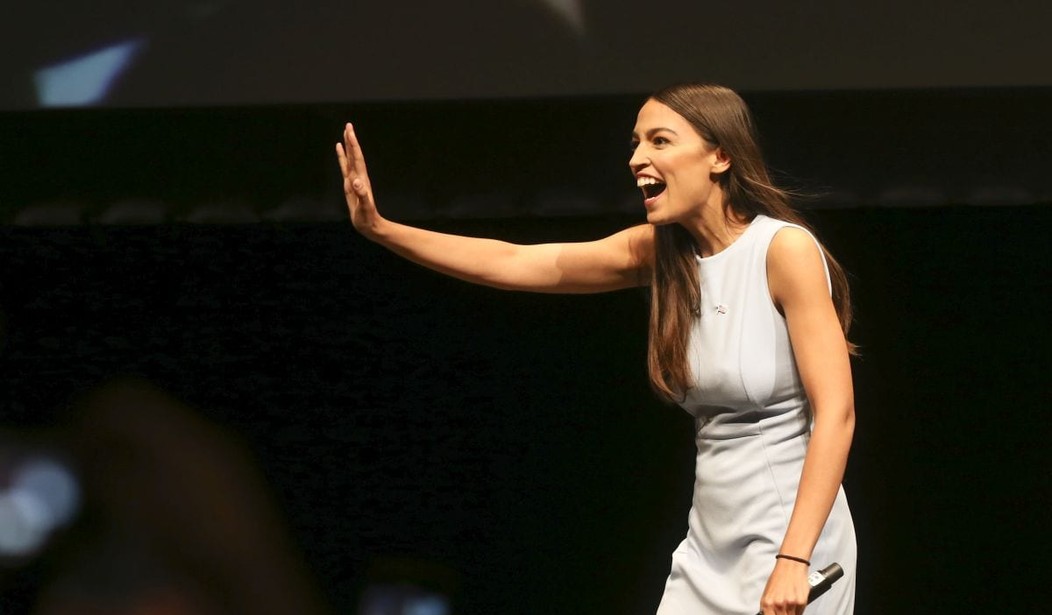Imagine a big government boondoggle with the disorganization of a poorly-run non-profit organization and “customer service” that treats customers like driver’s license applicants at the DMV. That’s how Rep. Alexandria Ocasio-Cortez (D-N.Y.) wants banking to work.
America’s most infamous former bartender proposed this idea with Sen. Bernie Sanders (I-Vt.), the runner-up for the 2016 Democratic presidential nomination.
“We should have a not-for-profit public option for basic banking services, and we should be piloting these projects through the U.S. Postal Service,” Ocasio-Cortez said, apparently with no irony.
.@RepAOC "We should have a not-for-profit public option for basic banking services, and we should be piloting these projects through the @USPS" #postalbanking pic.twitter.com/dobyU4hdT2
— Take On Wall St (@TakeOnWallSt) May 9, 2019
In the video, a tired Sanders ends his yawn to make a gesture of agreement.
It seems AOC has heard that 34 million American households are “unbanked” and she thinks the best solution is government — of course! But she also wants to phrase it like the government-takeover of health care: Let’s provide a “public option,” which will eventually become the only option. Oh, and let’s make it sound nice and caring, like the Salvation Army — it’s a non-profit!
It is true that millions of Americans lack access to the basic services that traditional banks provide, from checking and savings accounts to credit and debit cards to online payment options. Banks know there’s a problem, and so they have been creating innovative ways to meet the need.
The Consumer Financial Protection Bureau (CFPB), the least constitutional part of Dodd-Frank, has tried to regulate the banks, stopping them from meeting the market needs of the unbanked.
In fact, the Dodd-Frank financial reform law wreaked havoc on the U.S. banking system. Intended to prevent big banks from growing bigger and crowding out smaller ones, it arguably reinforced the large banks and led to the decline in smaller financial institutions. Before 2010, the FDIC approved an average of 170 new banks a year; from then until 2016, it had only approved one new bank.
Meanwhile, government figures indicated the U.S. was losing one community bank or credit union a day. Larger banks, by contrast, have seen an increase in their market share. As HotAir’s Ed Morrissey points out, Dodd-Frank shows that “regulatory expansion disproportionately impacts smaller players in any market,” leading to fewer options for consumers and less competition for entrenched big businesses.
The Durbin Amendment to Dodd-Frank wiped out low-cost checking accounts for roughly one million people after it took effect in 2011.
More regulation makes problems worse, not better, for those in need of banking services. AOC’s program seems reminiscent of Obamacare, which promised new options but wreaked havoc on the market, leaving fewer options in its wake.
Many of the unbanked do not have bank accounts because they do not understand how easy it is to set one up. Some Americans are intimidated by the prospect, but it is rather simple. My wife opened an account with $25.
Yet AOC seems to think that the only solution is to create a new government boondoggle. This would be run by the post office, with its short hours, lost packages, and costs that go up as demand for the product goes down (ahem, stamps).
For good measure, she’ll make it corrupt and inefficient like most non-profits. That’s because government is always the answer, and the self-avowed socialist beside her nodded along.
Follow Tyler O’Neil, the author of this article, on Twitter at @Tyler2ONeil.









Join the conversation as a VIP Member